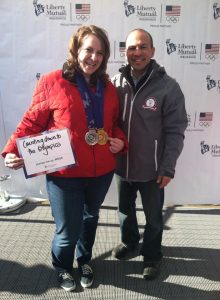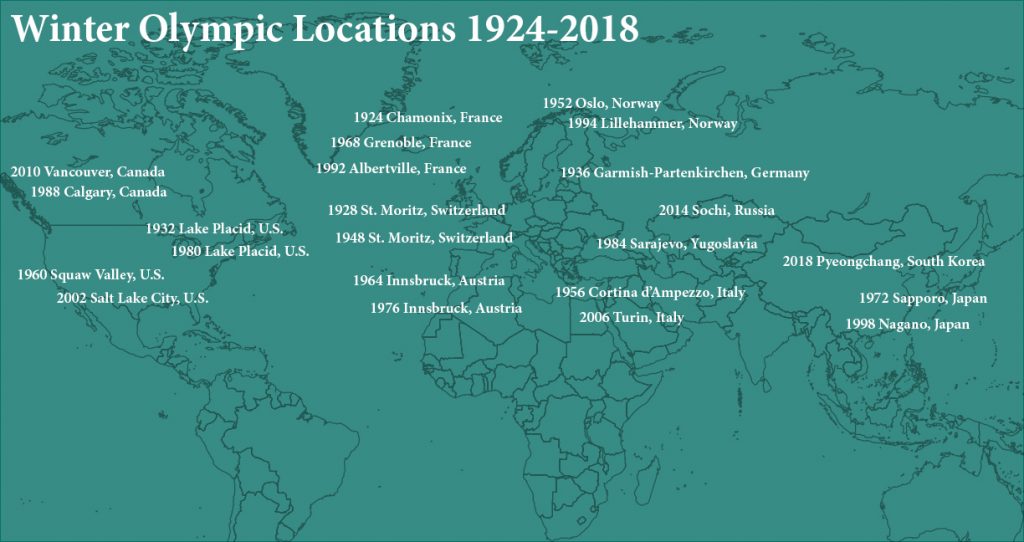
Editor’s note: this story pairs with “Reflections on the 2002 Winter Olympics”
The 2018 Winter Olympics begin Friday, Feb. 9, and few people are more excited to watch them than Orem resident Whitney Sorensen.
Sorensen credits her Olympic passion to living in Utah when Salt Lake City was awarded the 2002 Olympic games, re-creating figure skating routines on the carpet with her sister and watching the movie “Cool Runnings.” But what keeps Sorenson coming back year after year is the unique situation the Olympics provides for athletes.
“I think for me, I’m really into the athlete’s journey,” Sorensen said. “It’s not something that happens every year, so it’s a kind of do-or-die situation. Also, it’s an international thing so I get to hear about athletes from other nations and get to hear about sports that don’t always get the attention.”
The upcoming Olympics will be held in Pyeongchang, South Korea, Feb. 9–25. In summer 2015, the International Olympic Committee added four new events to make their debut in 2018: mass start in speed skating, big air snowboarding, freestyle skiing and mixed doubles in curling.
Pyeongchang is 16 hours ahead of Utah’s time zone, which presents a challenge for U.S. spectators. But one thing is for sure: Sorensen will be watching as much of the Olympics as she can.
Every winter games creates a nostalgic period for Utahns to reflect on the 2002 games. Now, 16 years later, Fraser Bullock, who was chief operating officer and chief financial officer for the 2002 Olympics, still reflects on the exposure Utah received because of the Olympics.
“Before 2002, Salt Lake and Utah were relatively unknown in the world,” said Bullock. “The 2002 games changed that completely. Salt Lake became well known around the world, not only for hosting the games but for the mountains and the people.”

Mitt Romney brought in Bullock to work on the Salt Lake Organizing Committee after a scandal broke about the Salt Lake City bid committee bribing members of the International Olympic Committee to award Salt Lake City the 2002 Olympics.
Romney and his team helped turn the 2002 Olympic game’s deficit into $100 million of profit. The Salt Lake City Olympics are viewed as the best operated games in history, according to Bullock.
But before the games occurred, not everyone was sure of their success.
“If you look at the poll before the games, 55 percent of the population was supportive,” Bullock said. “After the games, it was over 90 percent. People were perhaps nervous about what could happen.”
Bullock was recently made co-chair of the Utah Olympic Exploratory Committee, which was officially announced in October 2017. The committee is comprised of a few individuals who worked on the 2002 games, former Olympians and Paralympians, leading business figures and a few politicians, including Utah Governor Gary Herbert, Salt Lake City mayor Jackie Biskupski and Utah’s Speaker of the House Greg Hughes.
The committee is exploring the feasibility of Salt Lake City, including Park City, hosting the 2026 or 2030 Winter Olympics. Bullock said work has continued behind the scenes for years to figure out when the Olympics could come back.
“The opportunity was really held up by Los Angeles bidding for the 2024 games,” Bullock said. “It was resolved this summer when they were awarded the 2028 games. Now that that’s settled, we can come forward and say, ‘Now let’s look at the winter games.’”
Although the committee is focusing more on the 2030 games, it’s acting now because in 2017, the International Olympic Committee uniquely awarded two summer games at the same time. Bullock and the committee are preparing in case the committee decides to award the 2026 and 2030 games at the same time as well.
The committee will bring its report before the state legislature in February. Salt Lake City is one of three U.S. cities in the discussion for future bids. Denver, Colorado, and Reno-Tahoe, Nevada, are also looking into bid possibilities. However, Bullock feels confident in Utah’s prospects.
“We’re at a very significant advantage to have already hosted the Olympics,” Bullock said. “It reduces the cost. We have an experienced team of people, so it saves us cost in putting together the plans. The (International Olympic Committee), who ultimately votes on this, is also very focused on utilizing existing infrastructure.”
According to the October 2017 performance audit of the Utah Olympic Legacy Foundation, only $40 million is needed to make updates to the existing Olympic venues in Utah. Creating new Olympic venues in a city without existing Olympic infrastructure could cost several hundred million dollars.

But there are factors that could prevent Utah from hosting in 2026 or 2030. Part of the exploratory committee’s report will take into consideration the impact of the U.S. hosting back-to-back games. With Los Angeles being awarded the 2028 games, the committee may prefer to choose different countries for 2026 and 2030. However, there are fewer cities that can qualify to host winter Olympic games, so there may be fewer applicants, according to Bullock.
Another impact from hosting back-to-back games is the potential drain on sponsorship dollars, which could create some additional economic challenges. The committee also plans to look into the need of adding new venues for the events that have been added to the games since 2002.
After the report has been submitted to the legislature and if it decides to move forward, Salt Lake City will seek to be selected to once again represent the U.S. The process will then conclude when the International Olympic Committee awards the 2026 games in October 2019.




